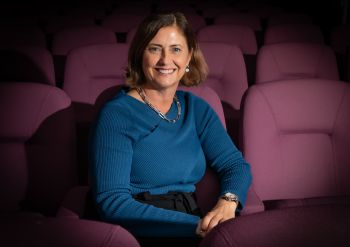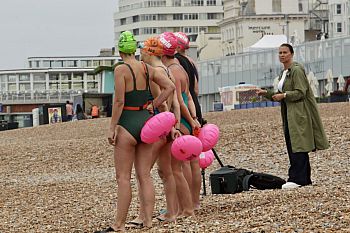News
Spotlight on Researchers: Ali Ramsey
Posted on behalf of: Sussex Researcher School
Last updated: Tuesday, 30 April 2024

Ali Ramsey
The Journey to a PhD
I've always wanted to do a PhD. However, I delayed for several years due to family commitments. My life went in a different direction and I ended up working as a documentary maker at the BBC and other production companies, but the desire to do a PhD has always been there.
Fast forward to 2020, during the Covid lockdown, I noticed that my Instagram was becoming dominated by topics around menopause. There had also been some quite high-profile television documentaries about menopause, fronted by famous women in their 50s and 60s. I became very intrigued as to why menopause was gaining visibility in the media, the political sphere and in public life generally.
To complete my PhD full time, I went part time at my production company Digital Drama. The projects undertaken by Digital Drama usually involve working with communities to co-create arts and heritage projects, such as plays, podcasts, films, exhibitions, and installations.
I found the transition to a PhD very natural, due to the level of research within creative industries. While the type of research can be different, the core skills are transferable between the spheres of filmmaking and academia.
The Research
I'm particularly interested in the impact of this new visibility of menopause in public life. My research focuses on media representations of menopause, in the UK, including why it has become more visible and whose interests that serves.
Menopause has been much more visible since 2015, when The National Institute for Health and Care Excellence (NICE)* guidelines on menopause were published. A subsequent increase in press led to menopause being discussed in a series of high profile documentaries and it has continued to grow from there.
The rise of ‘meno-influencers’ on social media has had a significant impact. In the 2000s there were closed chat rooms and Facebook groups discussing menopause. However, Instagram and TikTok have enabled people to share their personal stories more publicly. The increase in visibility of menopause has also been influenced by younger women talking about period positivity.
I think there are two important things going on in menopause representation in media at the moment in the UK. The first is the rise in grassroots activism, with groups such as #MakeMenopauseMatter. They are trying to educate people about menopause and inform policy in healthcare, which I believe to be very positive. At the same time, there appears to be a neoliberal commodification of menopause. When anything becomes popular in the press, I think there's an automatic assumption that it can make somebody somewhere some money. I'm very interested in marketing and the trend of celebrities becoming the ‘face of menopause’, and that menopause has become a wellness brand.

Ali Ramsey directing swimmers on Brighton beach.
The public face of menopause is overwhelmingly white and middle class, as shown in television documentaries by the choice of presenters. Ironically, until recently, these women would have been ‘disappeared’ from our TV screens for being over 40, but there’s still a distinct lack of diversity in how menopause is represented in the media.
I’m doing a PhD in creative and critical practice, involving the creation of an artefact as well as writing a thesis. Therefore, I have produced a 40-minute experimental documentary.
In my documentary, Menopause: The Movie, I have employed a particular filmic technique called found footage filmmaking, incorporating over 250 individual archival sources and conducting a series of oral history interviews with people about their lived experience of menopause.
I think intersectionality is really important, so I have used the ‘telling case’ theory as part of my critique. I carefully selected interviewees to represent a breadth of experiences from different socioeconomic and cultural backgrounds. Challenging the diversity of content within film archives and critiquing the values of those who curate them identifies who is missing, and why.
The biggest challenge in my research field is that filmmaking is expensive. Fortunately, I'm funded by CHASE**, which has supported the making of this film. However, the licensing and financial restrictions on the creative re-use of archive footage mean that I have had to be more creative with available materials.
Achievements and the Future
My key achievement is the impact of ‘Menopause: The Movie’, as it has been shortlisted by several film festivals. It was nominated for Best Documentary at the LA Femme International Film Festival in Los Angeles and also won an award at the Woman Over Fifty Film Festival at the Depot in Lewes.

Ali Ramsey at LA Femme Film Festival 2023
I was invited to present my work at the Scholarly Association of Menopause Studies launch event. They're a group of academics working in this emerging field of medical humanities and it's great to be part of this conversation.
I won the Adam Weiler Impact Award runner up prize in 2023. It felt fantastic to be recognised by the university and winning a pot of funding has furthered the impact of my project.
The film has been screened and discussed with a wide audience of academics, filmmakers and general public. Therefore opening up conversations, which I think is empowering for women and beneficial for society, as it’s something that affects over half the population. I hope that my work gives more prominence to menopause in media practice.
I'm also working as a research assistant with Professor Joanna Callaghan on her impact project ‘Goodbye Breasts!’ It’s an amazing creativity and health project featuring an autoethnographic film and exhibition. It’s great to have the opportunity to learn so much from Joanna and her inspiring work.
I’d like to continue making documentary films and build upon my PhD. I've particularly enjoyed developing the found footage filmmaking technique used in Menopause: The Movie.
I have enjoyed every minute of my PhD and would love to continue my research around media and menopause in the future.
* evidence-based recommendations for health and care in England and Wales
** Consortium for the Humanities and the Arts (South-East England)
Interview by Shona Clements